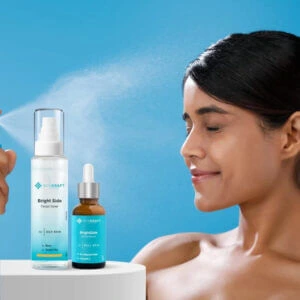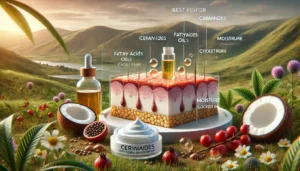Choosing the right skincare products can be overwhelming, especially when it comes to serums and moisturizers. Both are essential components of a skincare routine, but they serve different purposes and offer unique benefits. In this blog post, we’ll compare skin serums and skin moisturizers to help you determine which is best for your skin type and concerns.(Skin Serum vs Skin Moisturizer)
What is a Skin Serum? (Skin Serum vs Skin Moisturizer)
Skin serums are lightweight, fast-absorbing liquids designed to deliver high concentrations of active ingredients directly to your skin. They typically have a thin, watery consistency, which allows them to penetrate deeper layers of the skin. Serums target specific skin concerns, such as fine lines, hyperpigmentation, and dehydration.
Benefits of Skin Serums:
- High Concentration of Active Ingredients: Serums are packed with potent ingredients like vitamins, antioxidants, and peptides.
- Deep Penetration: Their lightweight formula allows active ingredients to reach deeper layers of the skin.
- Targeted Treatments: Serums address specific skin issues, making them ideal for personalized skincare routines.
- Quick Absorption: Serums are quickly absorbed, leaving no greasy residue behind.
What is a Skin Moisturizer? (Skin Serum vs Skin Moisturizer)
Skin moisturizers are thicker creams or lotions designed to hydrate and protect the skin’s outer layer. They help to lock in moisture and create a barrier against environmental aggressors. Moisturizers are essential for maintaining skin hydration and preventing dryness and irritation.
Benefits of Skin Moisturizers:
- Hydration: Moisturizers provide essential hydration, keeping the skin soft and supple.
- Barrier Protection: They create a protective barrier to shield the skin from environmental damage.
- Soothing Properties: Many moisturizers contain ingredients that soothe and calm irritated skin.
- Long-lasting Moisture: They provide long-lasting hydration, preventing dryness throughout the day.
Comparing Skin Serums and Moisturizers
Ingredients:
- Serums: Typically contain a high concentration of active ingredients like hyaluronic acid, vitamin C, retinol, and peptides.
- Moisturizers: Often include hydrating ingredients like glycerin, ceramides, and shea butter, as well as occlusive agents to lock in moisture.
Consistency:
- Serums: Lightweight, watery, and quickly absorbed.
- Moisturizers: Thicker, creamier, and designed to stay on the skin’s surface for longer-lasting hydration.
Usage:
- Serums: Applied after cleansing and before moisturizing to deliver targeted treatments.
- Moisturizers: Applied as the final step in a skincare routine to seal in moisture and protect the skin.
Which Should You Use?
The choice between a serum and a moisturizer depends on your skin type and concerns. Ideally, both should be incorporated into your skincare routine for optimal results.
- For Dry Skin: Use a hydrating serum with ingredients like hyaluronic acid, followed by a rich moisturizer to lock in moisture.
- For Oily Skin: Choose a lightweight, oil-free serum to address specific concerns and a gel-based moisturizer to hydrate without clogging pores.
- For Aging Skin: Incorporate an anti-aging serum with ingredients like retinol or peptides, followed by a moisturizer that provides hydration and enhances skin elasticity.
- For Sensitive Skin: Opt for a gentle, calming serum with ingredients like niacinamide, followed by a soothing moisturizer to prevent irritation.
Both skin serums and moisturizers play vital roles in a comprehensive skincare routine. Serums offer targeted treatments with high concentrations of active ingredients, while moisturizers provide essential hydration and protection. By understanding the differences and benefits of each, you can create a personalized skincare routine that addresses your specific skin needs.




